Editor’s Note: This is the 22nd in a series of stories researched during Don and Nancy Harrison’s 50th Wedding Anniversary cruise from Sydney, Australia, to San Diego. Previous installments of the series, which runs every Thursday, may be found by tapping the number of the installment: 1, 2, 3, 4, 5, 6, 7, 8, 9, 10, 11, 12, 13, 14, 15, 16, 17, 18, 19, 20, 21
By Donald H. Harrison

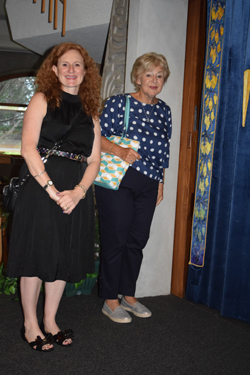
AUCKLAND, New Zealand – Call it “nature” or call it “nurture”—or perhaps it’s some of both—but sisters Rachel Lerner, 48, and Juliet Moses, 45, have become leaders in Auckland’s Jewish community.
Rachel Lerner chairs the board of the Auckland Hebrew Congregation, while Juliet, who is three years younger, serves as the spokesperson for the New Zealand Jewish Council, which is the umbrella organization for synagogues, the Jewish Federation, B’nai Birth, Holocaust Survivors, and other communal organizations.
The sisters are the daughters of Roger and Barbara (Paykel) Moses—both of whom can boast to be descendants of New Zealanders who were active in the Jewish community and successful both in business and civic affairs.
Barbara’s grandfather, Max Paykel, who had immigrated from Russia to New Zealand via Sheboygan, Wisconsin, initially opened a general store in the small town of Matakohe on New Zealand’s North Island. Townspeople often paid for their goods with gum from the kauri tree, which can be used in varnishes and various resin-based products. After becoming successful in the kauri gum business, Max moved to Auckland, where he became even more successful in the wool and hide business. He was elected as secretary-treasurer of the Auckland Hebrew Congregation.
Barbara’s father, Joshua Paykel, attended Harvard University in Massachusetts. In the United States, he met pianist Eva Stern, who as his wife would become well known in New Zealand music circles.
Barbara, a professional cellist and teacher, continued the Paykel family tradition of service to the Jewish community, serving as a board member of Shalom Court, which is this city’s Jewish Home for the Aged. Her brother, Eugene moved to England, where he became chair of the psychiatry department at Cambridge University.
On the Moses side of the family, Roger’s grandfather, Claude, was a dentist who invested in the Maple Furniture Company started by his brother, Harold. He served two terms as president and one as secretary of the local Jewish community.
Roger’s father, Sidney, was perhaps the best-known member of the family, having served as managing director of the Maple Furniture Co., Ltd; president of the New Zealand Retailers Federation, and in 1967 as chairman of New Zealand’s Decimal Currency Board, which oversaw this country’s transition from pounds to dollars. In 1980, Sidney was named a Commander of the Most Excellent Order of the British Empire (CBE). As a younger man, Sidney won honors in a completely different field – he was a champion road-racing motorcyclist, winning the New Zealand title three times. He also represented New Zealand at the International Tourist Trophy Races in the Isle of Man, United Kingdom.
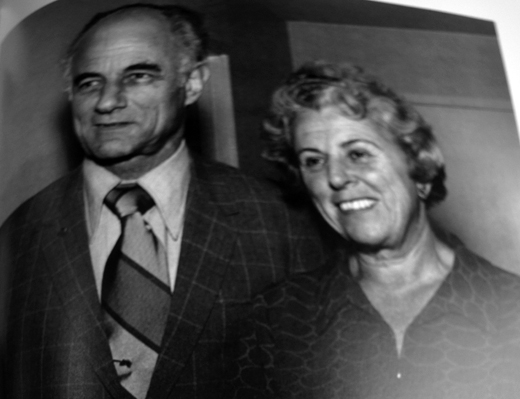
Sidney’s wife, Dorothy, was the daughter of Rabbi Solomon Katz, a longtime spiritual leader of the Wellington Hebrew Congregation, which follows Orthodox rites. (See Story 16 in this series). Dorothy became well known as the Wellington correspondent for the New Zealand Women’s Weekly and other publications. She frequently covered Royal Visits to New Zealand, and was in England for Queen Elizabeth’s coronation.
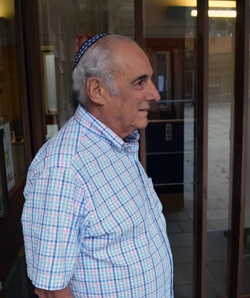
Roger Moses, the father of Rachel and Juliet, is no slacker either. He was the founder of New Zealand’s first financial planning practice, which eventually grew to 15 offices throughout New Zealand. An inaugural board member of the Institute of Financial Advisors, he served as that organization’s national chair from 1988 to 1991. He chaired the Trust Board for 20 years of the Auckland Chevra Kadisha, and currently is heading a drive to create a Jewish Museum in Auckland. Sports and music are two other abiding interests. He was inaugural chair of the Auckland Cricket Development Foundation, and a vice president and treasurer of the Auckland Table Tennis Association. He has served as chairman of both Chamber Music Auckland and Chamber Music New Zealand, and as deputy chair of the New Zealand Symphony Orchestra Foundation. Additionally, Roger is a Trustee and Ambassador for Big Buddy, a charitable group that mentors fatherless boys.
So, given such family traditions of service, perhaps it is not surprising that Rachel and her younger sister (by three years) Juliet feel a deep sense of responsibility to the Jewish community in which they were raised. Both have earned law degrees, although Rachel no longer practices at present.
As chair of an Orthodox congregation serving some 500 families, Rachel’s duties primarily involve administration and fundraising. Showing Nancy and me through the synagogue, she pointed out various architectural and decorative features. The Auckland Hebrew Congregation, also known as Beth Israel, was designed by Jewish architect John Goldwater. Various touches invoke the Maoris, New Zealand’s indigenous people, with whom the Jewish community has a mixed relationship. Some Maoris look upon Israeli Jews as a fellow indigenous people, who have reclaimed past glories just as the Maoris themselves are in the process of doing. Other Maoris look upon Israelis as colonialists, subjugating indigenous Palestinians.
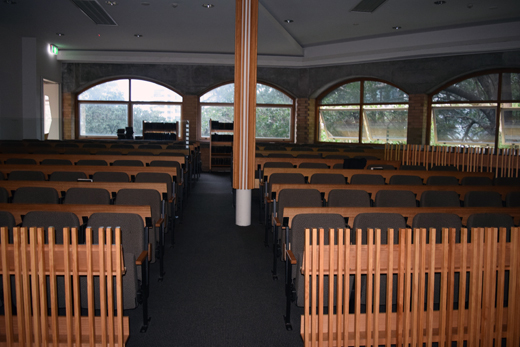
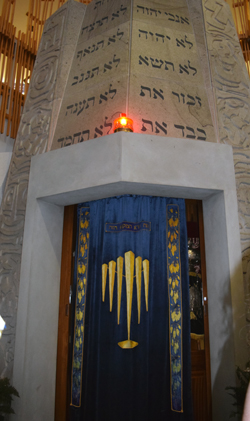
The congregation has a stunning Aron Kodesh, with a Kiwi-influenced Torah curtain below carvings in Hebrew of the Ten Commandments. I was particularly taken with a Torah mantle that pictures a pohutukawa flower, native to New Zealand. That particular mantle covers the Torah completed in 2016 by a New Zealand sofer. The mehitzah and other divisions in the sanctuary look similar to the fences surrounding a Maori village, known as a pa.
“Maori culture is definitely being reinvigorated in New Zealand,” Rachel said. “I think that it is due to an acceptance that it is something to be celebrated and brings a unique flavor to New Zealand. In days gone by a totally opposite view was held: If we are all New Zealanders, then we must all be the same.”
Like her sister, Juliet grew up in the bosom of the Jewish community and traveled to Israel under the auspices of the Australasian Union of Jewish Students. “I was on the Jewish Council for a while, then I had my children,” Juliet said. “The really big change was in 2014 during the Gaza War. This was a sea change for a lot of my friends in New Zealand. There was a real deterioration in media and social media, and we decided that we really needed to get ourselves more organized and be more proactive. At the same time, there was an anti-Israel protest at the downtown square, and BDS protesters chaining themselves, calling for divestments and the like. I ended up in the middle of that protest, to see what was happening. I was in the middle of a squabble, but I knew I was safe because a lot of policemen were there. A lady was screaming that Israel was an apartheid state. I asked her to explain to me how she thought it was. She couldn’t answer. She got very flustered, and told me to talk to their officer. I said, ‘you are yelling about it, you must know about it!’ The media swooped in on me, microphones and cameras, and I had a platform. I said my piece, and instead of the protests, they ran what I said, the lone woman. It thrust me into the spotlight.”
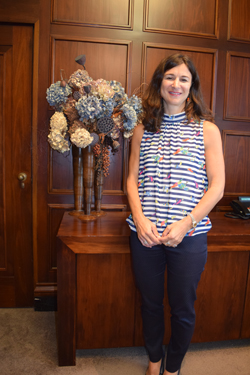
Since that time, with a good research attorney’s persistence, Juliet has monitored, criticized, and sometimes won apologies from the New Zealand news media, which she says has an anti-Israel bias. “Our national broadcaster, Public Radio, is disgraceful and a lot of our TV is unbalanced,” she said. “We’ve had a couple of victories” following submission of written arguments to a media tribunal. “We won a complaint on broadcasting standards of national radio broadcasting. An ANC representative from South Africa was here, talking about the ‘similarities’ between apartheid, Zionism, fascism, Nazism. It was the worst thing I had ever heard, incredibly awful. I drafted the New Zealand Jewish Council’s complaint and we won that on lack of balance.”
What was the penalty for the broadcaster, I asked. “Actually nothing,” she replied. “He didn’t have to apologize, but still it is something. We also won one against our state TV channel which broadcast something on its Maori news channel about the so-called ‘peace flotilla’ that went to Gaza. There was a Green Party Member of Parliament [Marama Davidson] who is Maori, and staunchly anti-Israel. She was on the flotilla and said she was trying to break the illegal blockade of Gaza. Sir Geoffrey Palmer, our former prime minister, was commissioned by the United Nations, to give an opinion on that and found the blockade wasn’t illegal. I challenged the TV station on that, and actually won that as well.
“There were no repercussions as such, but all these things are important to make broadcasters think what their responsibilities are,” Juliet added. “They recently did something on Lorde [a Grammy-winning vocalist who canceled her Israel appearance at the behest of BDS organizers] and contacted someone for our side.” Juliet has become to go-to person whenever developments in the Israel-Palestinian conflict result in “a big palaver and a lot of media discussion.”
“Most people in New Zealand, the majority, would support the right of Israel to exist,” Juliet said. “Some people might understand that to mean that they are true Zionists. The trouble is that the meaning of ‘Zionist’ has been corrupted in New Zealand; it is being associated with ‘genocide.’ If you enter the rabbit hole of social media, you will see someone call someone else a ‘Zionist,’ as if that were the worst possible thing; like being called a ‘Nazi.”
Her mission, “really, is a matter of getting our side out,” that is telling Israel’s story.
*
Harrison is editor of San Diego Jewish World. He may be contacted via donald.harrison@sdjewishworld.com
Pingback: Tonga’s love for the Jews of the Bible | San Diego Jewish World